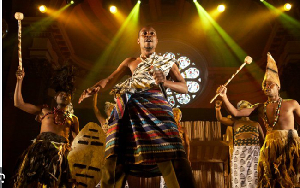Theatre is one of the cultural art forms that best exemplifies Africa. African theatre is deeply rooted in storytelling, rituals, and communal experiences, reflecting the continent’s complex history and indigenous practices.
Since the earliest days of human civilization, African communities have used performance as a means of communication, education, and cultural preservation.
The Roots
Oral traditions played a crucial role in the development of theatre in Africa. Traditional storytellers were the custodians of history, culture, and knowledge, passing down tales from generation to generation.
These performances were not merely recitations but dynamic, interactive events that involved the audience and often incorporated elements of drama and improvisation. They were deeply spiritual, connecting communities with their ancestors, the divine, and the natural world. These oral narratives laid the foundation for the structured forms of theatre that would emerge later.
The arrival of European colonizers marked a significant turning point for African theatre. Western-style theatre was introduced, and schools and theatres were established to perform European plays. This imposition of foreign cultural practices often sought to suppress indigenous forms of expression.
However, African theatre adapted and evolved rather than being entirely wiped out.
In many instances, African playwrights and performers merged traditional forms with Western theatrical conventions, creating a hybrid style that addressed both local and global themes. This period also saw the rise of theatre as a tool for political and social commentary. African playwrights used the stage to critique colonial rule and advocate for independence, employing satire, allegory, and symbolism to convey their messages.
A Post-Colonial Renaissance
In the mid-20th century, a wave of independence swept across the continent, leading to a renaissance in African theatre. Freed from the constraints of colonial rule, playwrights and directors began to explore themes of identity, liberation, and the post-colonial experience.
This era saw the emergence of some of Africa’s most celebrated dramatists, including Nigeria’s Wole Soyinka, the first African to win the Nobel Prize in Literature. His work, deeply rooted in Yoruba traditions, exemplifies the blend of indigenous and Western forms. His plays, such as Death and the King’s Horseman, explore the tensions between tradition and modernity, the individual and the community, reflecting the complexities of post-colonial African societies.
Beyond Soyinka, other playwrights made significant contributions to African theatre. Ghana’s Ama Ata Aidoo is renowned for her works that explore the role of women in post-colonial African society. Her play The Dilemma of a Ghost is a powerful commentary on cultural identity and the challenges African women face in navigating traditional and modern expectations.
South Africa’s Athol Fugard is another towering figure in African theatre. His works, such as “Master Harold”…and the Boys and Sizwe Banzi Is Dead, offered searing critiques of apartheid, highlighting the brutal realities of racial segregation and the human cost of institutionalized oppression. Fugard’s plays resonated in South Africa and beyond, gaining international acclaim and contributing to the global anti-apartheid movement.
Tanzania’s Ebrahim Hussein is also significant for his innovative use of language and his focus on the social issues facing post-colonial Tanzania. His play Kinjeketile, which dramatizes the Maji Maji Rebellion against German colonial rule, remains one of the most important works in East African theatre.
Contemporary African Theatre
Today, African theatre is a thriving art form that continues to evolve and adapt. Contemporary African playwrights and performers draw on a rich heritage while addressing the challenges and opportunities of the modern world.
Theatre festivals across the continent, from the Lagos Theatre Festival in Nigeria to the National Arts Festival in South Africa, showcase the diversity and creativity of African theatre. These events celebrate the continent’s cultural heritage and provide a platform for new voices and perspectives.
The history of African theatre is one of resilience, adaptation, and innovation. African theatre remains a vital and dynamic part of the continent’s cultural landscape. As it continues to evolve, it promises to remain a beacon of creativity and expression in Africa and beyond.
Africa News of Tuesday, 27 August 2024
Source: face2faceafrica.com

















